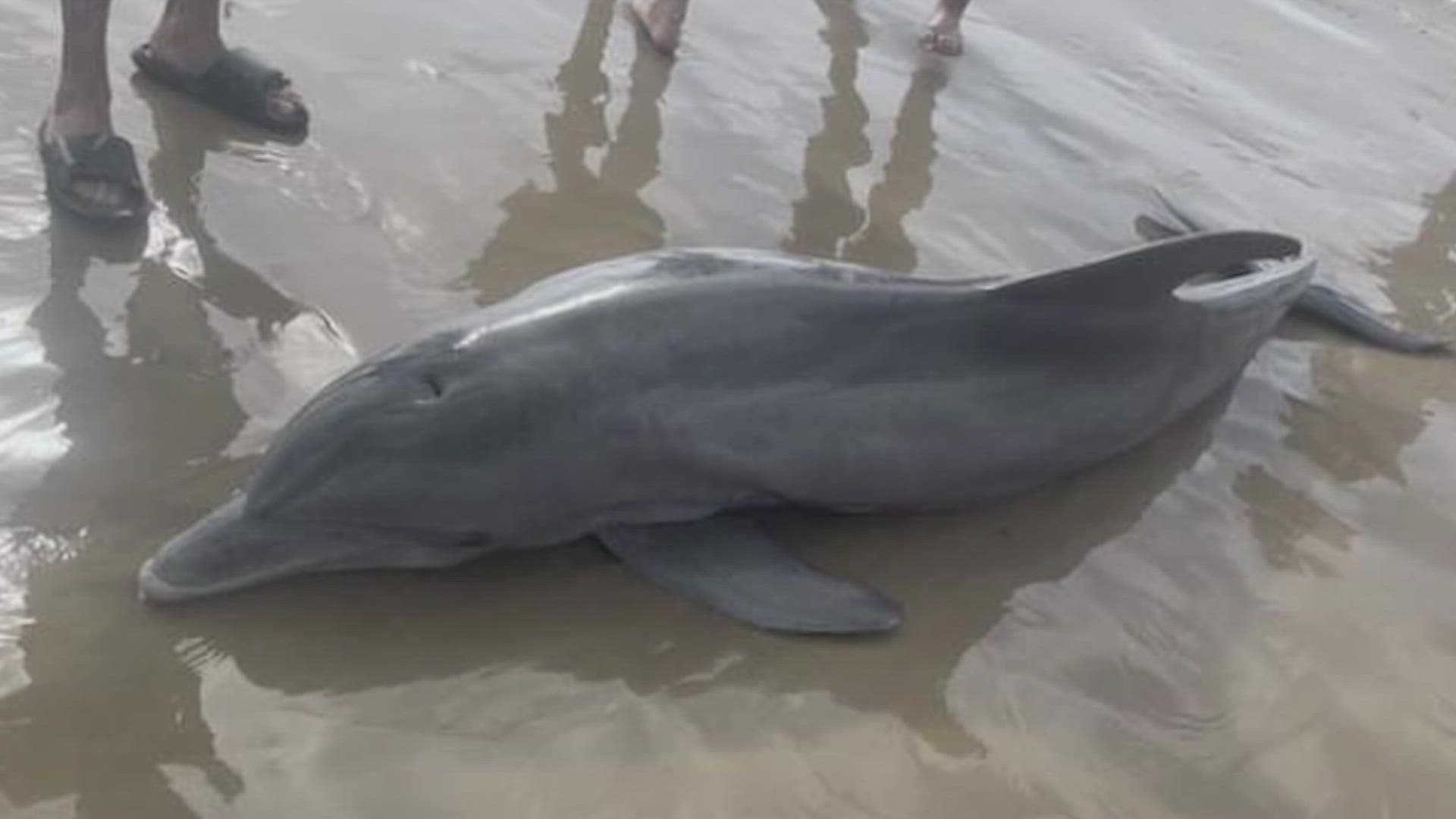QUINTANA, Texas — Beachgoers are being partially blamed for the death of a sick dolphin, according to the Texas Marine Mammal Stranding Network.
It happened on Quintana Beach, in the Freeport area. On Sunday, the beachgoers found a sick dolphin on the beach and pushed it back out to sea and attempted to swim with and ride the sick animal.
The female dolphin was ultimately stranded again on the beach where she was harassed by a crowd of people, the network said in a Facebook post.
"This type of harassment causes undue stress to wild dolphins, is dangerous for the people who interact with them and is illegal - punishable by fines and jail time if convicted," the Texas Marine Mammal Stranding Network said in the post.
TAMU Galveston Marine Biologist Dr. Christopher Marshall said that beachgoers might not have known that dolphins, and all marine mammals, as well as sea turtles, are federally protected.
“In this case, it’s a pretty egregious example of what not to do,” Marshall said. “People riding the animal, the animal was quite sick, already stressed at this point. The animal was probably on the brink and the stress is what killed it.”
Marshall said it’s not uncommon for bottle-nosed dolphins to wash ashore along the Texas coast but you should definitely follow the rules if you come across one.
“You could get into some serious trouble with law enforcement. You could face fines or imprisonment. It’s a serious issue," Marshall said. "It really enriches our lives to have these animals around us. They’re quite beautiful and they’re really important to the ecosystem.”
The network advises beachgoers to immediately call 1-800-9MAMMAL (9626625) if they find a live dolphin or whale stranded on a Texas beach. They also say to not push the animal back out to sea, attempt to swim or interact with them or crowd around them.
Click here to find out more about the harassment of wild dolphins.
Here's some more information from the National Oceanic and Atmospheric Administration Fisheries:
Why is it illegal to feed, attempt to feed, or harass marine mammals in the wild?
Marine Mammal Protection Act regulations prohibit feeding, attempting to feed, and harassing marine mammals in the wild. These activities are illegal because they harm the animals in the following ways:
- Marine mammals associate people with food, losing their natural wariness of humans or boats and becoming conditioned to receiving handouts.
- Marine mammals change their natural behaviors, including feeding and migration activities, and show decreased willingness to forage for food on their own. They may also begin to take bait/catch from fishing gear. These changed behaviors may be passed on to their young and other members of their social groups, increasing their risk of injury from boats, entanglement in fishing gear, and intentional harm by people frustrated with the behavioral changes.
- Marine mammals may eat contaminated (old or spoiled) food or non-food items. Feeding marine mammals inappropriate food, non-food items, or contaminated food jeopardizes their health.
- Marine mammals sometimes become aggressive when seeking food and are known to bite or injure people when teased or expecting food.
- Marine mammals include dolphins, porpoises, whales, seals, sea lions, and manatees.
How does the MMPA define "harassment"?
The MMPA lists two levels of harassment:
- Level A harassment means any act of pursuit, torment, or annoyance that has the potential to injure a marine mammal or marine mammal stock in the wild.
- Level B harassment refers to acts that have the potential to disturb (but not injure) a marine mammal or marine mammal stock in the wild by disrupting behavioral patterns, including, but not limited to, migration, breathing, nursing, breeding, feeding, or sheltering.
Does NOAA Fisheries have a policy about interacting with marine mammals in the wild?
NOAA Fisheries has a policy on human interactions with wild marine mammals that states:
- Interacting with wild marine mammals should not be attempted, and viewing marine mammals must be conducted in a manner that does not harass the animals.
- NOAA Fisheries does not support, condone, approve, or authorize activities that involve closely approaching, interacting, or attempting to interact with whales, dolphins, porpoises, seals, or sea lions in the wild. This includes attempting to swim with, pet, touch, or elicit a reaction from the animals.

